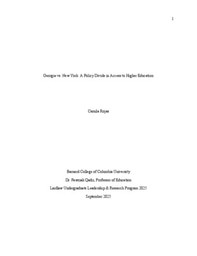Research Abstract
In June 2025, Texas became the first state to reverse its inclusive higher education policy, restricting undocumented students without DACA from receiving state financial aid and in-state tuition. Nationwide, access to higher education remains deeply unequal for undocumented students, who represent roughly 14 million of the U.S. population but only about 408,000 college enrollees. This study employs a comparative critical policy analysis to examine Georgia and New York’s higher education policies—covering financial aid, admissions, and institutional access—through Daniel Millan’s framework of “legal vulnerabilities,” which categorizes undocumented students’ experiences as dismissed, dormant, or deep-rooted. While Georgia and New York represent opposing policy extremes, undocumented students’ experiences share striking similarities, as both states’ policies construct undocumentedness as an identity rather than a systemic status. Students in Georgia often face deep-rooted legal vulnerabilities, while those in more accessible states like New York may experience dismissed legal vulnerabilities. Ultimately, this research highlights the need for stronger policy integration between the immigration and education sectors, increased investment in community-based initiatives, and enhanced educator training and awareness to better support undocumented students.

Please sign in
If you are a registered user on Laidlaw Scholars Network, please sign in